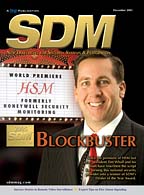
Success in many things is simple. In baseball, pitch accurately and hit the ball far. In golf, hit the ball more accurately than far. In tennis, steady playing counts for more than kill shots.
Like the baseball team from the Chicago area in which HSM’s Lisle, Ill., headquarters is located -the world champion Chicago White Sox -HSM has formed a team with a “win or die trying” attitude that doesn’t let obstacles keep it down, and has achieved its own championship as SDM’s 2005 Dealer of the Year.
For HSM, customer interactions have aided this winning strategy. The company emphasizes five “touch points”: account management, installation, service, monitoring and billing. Get these right and you win the game -but it may not be as easy as it looks.
“It looks very easy to be successful, but I think it’s very hard to do,” admits Timothy Whall, HSM’s president and chief operating officer. “If you can manage those five touch points with a high level of success for your customers, you’re going to be very successful in our business.”
Add to this recognition and reward programs for employees, more training for associates and exemplary internal evaluation methods, and success is achievable if not assured.
HSM was founded in June 2004 in partnership with security industry veteran James Covert, chairman and CEO based in the company's Jupiter, Fla., corporate headquarters, and GTCR Golder Rauner, Chicago, a private equity investment firm. At that time, the company that was acquired was Honeywell Security Monitoring, which was then owned by industry equipment supplier, Honeywell Security.
“This was a company that had been shrinking over the past four years -there was a great base here to build from, and what steps would we need to get it going in the right direction?” Whall asks.
Referring to the former Honeywell employees who joined HSM, he stresses, “We felt that if turned loose, this was a group that could compete well in the marketplace, and indeed in the first year, that is exactly what they’ve shown.”
HSM is currently ranked as No. 4 on the SDM 100, based on total gross 2004 revenue of $165 million, and $7.9 million in recurring monthly revenue from a subscriber account base of 120,000.
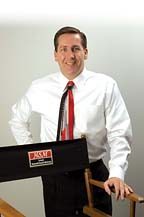
Timothy Whall, president and chief operating officer of HSM, Lisle, Ill., applies his past experience at a family security business to the new style of HSM, which attempts a local touch from a national platform.
This year, HSM’s total annual revenue will grow an estimated 15 percent, more than two-thirds of which is coming from organic growth, Whall reports.
The company also has increased revenue by acquiring four companies. In October, HSM purchased Jackson Burglar Alarm, Denver, and in July, two other companies: National Alarm Pro, Trumbull, Conn., and Sylvester’s Security Alarms Inc., Santa Maria, Calif. In April, it purchased the commercial accounts from ACS Security, Los Angeles.
Growth in national accounts in 2005 will be nearly 25 percent, estimates Tony Byerly, senior vice president of sales and national accounts. Non-residential accounts are expected to grow to an estimated 105,000 this year from 72,800 in 2004. Recurring monthly revenue is projected to increase 8.1 percent this year compared with 2004.
HSM has added more than 300 associates during its first year of operation to add up to a total work force of approximately 1,068 full-time employees. The company maintains it is the largest privately held commercial security company in the United States.
Despite its size, Whall emphasizes the company’s local flair. “HSM is large enough to have all the national resources to be a world-class provider,” he insists. “The real key for us is we’re small enough to treat every customer world-class.
“We still have the local flair, the local management, the local services with all the backing of a national company,” he points out. “Besides ADT, we’re the only true national provider that’s really focused on the core commercial and national account business.”
As the saying goes, “All government is local.” HSM management believes that providing security ultimately also is local. “I grew up working for my parents -the classic family-run operation –and I think the little guy or the smaller company has a lot to offer the customer in terms of that good personalized service where the customer enjoys a relationship with people as opposed to a company,” Whall relates.
“I don’t know that smaller companies learn from us as much as we’re trying to incorporate what they do and be sure our branches always stay close to the customer and we deliver that personalized experience,” Whall notes. “The reason people stay with us and continue to be customers is because they enjoy that relationship with their local branch offices.”
He adds that the backing of a large company behind the local branch offices is an added plus for the customer making the buying decision.
“Typically, the smaller companies have a better handle on who their customers are and they personalize their service more, whereas when you move to bigger companies, you fight the issue that your customer becomes an account number as opposed to a person with a building and needs,” Whall continues.
“So our belief is we hire the best general management team we can to lead our local offices, and they’ll bring that good personal service to our customers,” he concludes.
When pressed to name one quality that sets HSM apart from its competitors, Whall replies, “I would say it’s the teamwork that the staff exhibits toward each other to take care of the customers. I think we inherited a great group of employees on this acquisition that truly care not only about their customer, but they care about each other.
“The branch offices exhibit a great amount of teamwork among departments,” he insists. “They’re the kind of people who put the customer first, and they do what’s necessary to help them regardless of whether it’s their job specifically or not. I’m very impressed with the esprit de corps they have as a group and the genuine care and affection they have for each other out there in our offices.”
Whall has visited nearly each of HSM’s 50 regional offices three times in the first 15 months of operation. “I’ve made about 114 visits so far," he says.
“The trips have been a matter of doing town halls in front of the employees, asking them what we do well, what we could do better to better serve the customers,” Whall explains. “In one of the visits, we actually did a management review, where you sit down and the local leader explains his or her business, what the plan is and we review that. So we’ll have a good feel for who we have out there and the strengths and weaknesses of those people. I’m very impressed with the team we have.
“One of the main differentiators for us is we never tout the widgets,” he stresses. “We don’t think the widgets are actually what we’re selling. I think we’re a service provider. We think that our ability to get information in our customers’ hands is helpful in managing their businesses.”
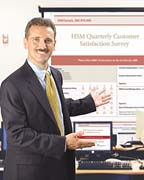
PHOTO BY JOHN GEIGER FOR SDM
Turnaround Artists
Purchasing HSM from Honeywell entailed moving 31 of the company’s offices out of Honeywell facilities and establishing HSM’s own information technology infrastructure. This enabled HSM to establish a single platform for monitoring, service, installation, sales, billing and other company functions. It was accomplished less than nine months after the sale of the company.
Many of HSM’s offices were moved out of Honeywell’s facilities three months ahead of the original schedule to reduce transition costs being paid to Honeywell. In one five-week period from Easter through the end of April 2005, 20 offices were moved, most on a Friday, and business was conducted in the new offices on the following Monday.
Additionally, a new leadership team was assembled, a new headquarters established in Lisle, Ill., and a new logo and brand announced at the ASIS Conference in Orlando, Fla., last September.
This level of activity requires special efforts by employees, Whall points out. “If there’s one factor we look for, it’s probably work ethic,” he declares. “It’s the desire and determination that you bring to the task at hand.”
Strong motivators are the company’s sales and service awards. Last year’s “Club Excellence” sales recognition trip for top performers was to Hawaii, and in 2006, it will be to the Grand Cayman Islands. The company’s sales force has been tripled since it was acquired from Honeywell.
An online point system for sales recognition and rewards is planned that will allow sales representatives to purchase merchandise with the points they earn.
A service award program recognizes significant milestones in employees’ careers with awards and gifts of their choosing from catalogs.
Sales compensation plans have been redesigned to emphasize service. Salespeople are not limited to certain markets or restrained by incentive caps. They stay with a customer once a sale is made.
A team selling approach is used with key accounts, especially national ones. Represented in such a sales call are installation, service, account management, monitoring and billing to show that the entire organization is committed to the customer, not just the sales associate.
Whall’s philosophy for the company is to rely on local managers to provide local service to customers. “We run the business with a lean corporate staff and give much of the decision-making in our branches to our local leaders,” he declares.
He leaves hiring up to the local managers. “Different branches have different needs,” he observes. “We count on that local leader to make the right hiring decision.”
Regarding training, during their first 60 days of employment, each new salesperson, national account manager, sales manager and general manager attends a week-long training course in Minneapolis; the course covers markets, business priorities, products and services. More than 110 employees have graduated from the course so far, which is conducted monthly.

PHOTO BY JOHN GEIGER FOR SDM
Community Involvement
HSM strives to be an important contributor to the communities it serves. “The philosophy is we expect our local leaders to participate actively in their communities,” Whall remarks. “Different branches have different things that are near and dear to them. We don’t really care what they participate in as long as they are giving back to the communities.
“We’ve got some great examples where our local leaders have rallied their teams to do good things,” Whall cites. He enjoys appearing at community events organized by local leaders around social issues.
The Monday after Hurricane Katrina hit the Gulf Coast, Whall, an HSM regional vice president, and others met with employees at a hotel in Baton Rouge, La. Donations to an employee relief fund from associates to help HSM employees who had lost their homes were not only matched but exceeded by the company.
“For our customers, we waited eight weeks and then started contacting every customer in the region we have just to see what was going on with their situation and what we needed to do to better serve them,” Whall relates. Associates from different branches assisted employees in the company’s New Orleans office to accomplish that task.
HSM employees also are involved in industry associations at their state and local levels. “I’ve been impressed by the activity level of our people,” Whall says about their association involvement, citing state presidents of the National Burglar and Fire Alarm Association (NBFAA) and presidents of local industry associations.
Other associations in which HSM is involved include the American Society for Industrial Security (ASIS), the Central Station Alarm Association (CSAA), the National Retail Federation (NRF), the Jewelers Security Alliance (JSA), the Retail Industry Leaders Association (RILA), the National Food Service Security Council (NFSSC), and the International Cargo Security Council (ICSC).
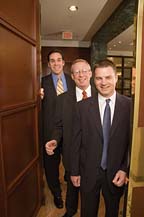
PHOTO BY JOHN GEIGER FOR SDM
Future Challenges and Goals
Whall emphasizes that Honeywell Security Monitoring was the fourth largest alarm company overall and the second largest in commercial/national accounts when it was bought and that it has been transformed in less than two years from negative to positive growth. But these are just the beginning of the challenges he sees.
“I think our challenge as we look out is to make sure that as we grow, we stay with what is successful for us, which again is the quality of the people we have, a lot of experience in our towns and our branches with those folks, and as you grow, you have to be particularly careful about who you bring into the organization and making sure we are making good quality hires every step of the way,” he concludes.
Along with financial goals, he has ones that are more aspirational - to make HSM the Nordstrom’s of the industry. “By the end of next year, have our service levels be such for our customers that we are able to actually trade on our reputation as the quality provider inside our industry space,” he resolves.
Adds Byerly, “Our focus has been on consistent delivery on each of those five customer touch points and actually becoming the industry gold standard.”
The company’s business for the last year was 95 percent commercial, Whall estimates, but installation and monitoring of more custom residential systems is planned.
Regarding acquisitions, he reveals, “We’ll continue to look at them - each of the acquisitions we did this year was a little different type. So we’ll continue to look for quality companies, and if the sellers are motivated to get out for whatever reason, and they’re running a good business, that will be who we’ll continue to look at as we move forward. We’ll have a few more.”
Little wonder that Whall is pumped about HSM’s future prospects. “The future is looking pretty bright,” he insists. “I think we have a great platform. The fact that we’ve been able to turn it around so quickly is really a testament to the energy and effort that our team members across the country have put forward.
“They’re growing their local businesses every day, they’re excited, they’re adding people into their branches, recruiting salespeople, recruiting technicians, they’re adding to their customer base, and it’s a great group and they’re fired up,” he enthuses. “I think that you’re going to hear a lot more from HSM in the years to come.”

PHOTO BY JOHN GEIGER FOR SDM
Sidebar: HSM at a Glance
Total estimated revenue, 2005: $178.2 million
Subscribers: 67,000 residential; 105,000 non-residential
Central stations: Minneapolis, Minn., and Santa Ana, Calif.; certifications include UL 827, UL 1981 and UL 2050.
Branch offices: 50 regional offices across the United States, covering 100+ major metropolitan areas.
More about HSM: www.HSMSecurity.com
Chairman & CEO: James Covert
President & COO: Timothy Whall

PHOTO BY JOHN GEIGER FOR SDM
Sidebar: A Passing Grade
Each quarter, HSM’s national accounts receive an innovative score card - in hardcover booklet form - that measures the company’s performance in its five touch point areas: account management, installation, service, monitoring and billing. The results are graphed.
For example, under installation, the on-time completions, return trips and compliance of installations are in bar graphs. Figures for pending installations, equipment ordered and work in progress are included along with other information.
“We’re actually not only saying it and doing it and holding people accountable to do it, but now we’re actually opening our books and saying, `This is how we’re performing,’ and saying, `Take a look - we feel very confident in our service delivery,’ and we’re more than willing to show that to our partners that are our customers,” emphasizes Tony Byerly, senior vice president of sales and national accounts.
“Half of our customers have been here over 15 years,” Byerly reports. “Obviously, they’re saying they enjoy the relationships with the people we have servicing them.”
Attrition will have been reduced by 2.5 percent over last year, a 19 percent improvement, declares Timothy Whall, HSM’s president and chief operating officer.
Whall suggested the idea of the score card, and it was taken to six of the company’s key customers to determine what data was most important to them and in what format they would like the information to be. That is how the five customer touch points were determined.
At the end of the score card, customers fill in their feedback and perceptions on the service they received, which HSM’s managers consider the most important part of the card.
“A real key difference here is that the ability of HSM to collect that data and to report it is unique in our industry, especially when you look at the national providers,” Whall maintains. “We’re on one IT platform, and all our five customer touch points are managed off of the same database.”
Don Young, HSM’s chief information officer, explains: “One thing we achieved when we separated from Honeywell was the consolidation of all data used to support those five touch points into a single environment. That allowed us a great opportunity to go forward with a one-stop shopping solution for our customers to see how we’re doing on all five touch points with our customer scorecard accessible 24/7 via the Internet.
“This was also a significant step forward in managing the relationship between the billing and operational requirements of our customers, as is evidenced by our improved attrition and receivables performance,” Young notes.
Adds Byerly, “We actually trend your account for you on each of the touch points over the course of a year. So at the end of the year when you get your final report card, you’ll see how we’ve performed on each of those touch points throughout the year based on each quarterly result. You'll actually see the performance on your account."
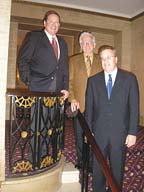
PHOTO BY SDM STAFF
Sidebar: Video a la Carte
A new marketing program HSM has introduced is called eVideoManager. It includes four different ways of utilizing remote video monitoring: alarm verification, guard tours, escorting people, and opening and closing services.
The services are priced aggressively, maintains Tony Byerly, senior vice president of sales and national accounts, and they can be ordered as a package or priced a la carte.
“The reason we did that obviously was determining what the customer needs and what can fit their budget,” Byerly explains. “The nice thing is as you package it, you can see the incremental cost you’re adding as a result of that packaging.
“We’ve also structured some of the services, such as eVideo Guard Tour, actually based on how many guard tours you want us to do and how long you want us to spend on each of those guard tours,” he continues. “It’s very customized with respect to the specific needs of the customer.”
Launched last September, Byerly reports strong sales in the first month of its being available. “It’s been a great offering for us,” he asserts. “We’ve had a lot of interest.”
Adds Don Young, HSM’s chief information officer, “I believe HSM’s eVideoManager offering is very unique in regard to its actual pricing for the customer based on activity, which is not commonly found in the industry.”
Also unique to HSM’s offering is that instead of switching among monitors, all of the information that the operator needs for alarm data and video are on one screen at one of the company’s ProtectionNet customer service centers, Young points out.
He continues, “This has proven to be a far more effective method to handle the integration of the customer’s video and digital signaling technology in the field.” HSM operates two central stations, one in Minneapolis and the other in Santa Ana, Calif.
“We thoroughly enjoy demonstrating this technology to our customers, and thus far each of them has been very impressed with the efficiency and ease of handling their premise activities from our monitoring centers,” Young observes.

PHOTO COURTESY OF HSM
Sidebar: HSM Turns Around Declining RMR
Recurring Monthly Revenue (RMR) 12/31/02 $8,395,500 -8.9%
12/31/03 $8,030,730 -4.3%
12/31/04 $7,916,000 -1.4%
12/31/05 $8,556,000* 8.1%
12/31/06 $11,000,000** 28.6%
*estimated / ** projected
Percent change from previous year
12/31/02 -8.9%
12/31/03 -4.3%
12/31/04 -1.4%
12/31/05 8.1%
12/31/06 28.6%
Sidebar: National Accounts Tripled
HSM’s growth in national accounts in 2005 will be nearly 25 percent, estimates Tony Byerly, senior vice president of sales and national accounts.
National accounts generate approximately 35 percent to 40 percent of the company’s new orders and include customers such as Checkers Drive-in Restaurants, Kuehne and Nagel Logistics, Costco Wholesale, and The Cheesecake Factory Inc.
Honeywell had been in national accounts since the 1970s, Byerly relates, but in the last few years of its ownership, Honeywell had been in more of a maintenance mode rather than actively pursuing new accounts, he maintains. So HSM has been able to triple the revenue from national accounts it services since it bought the business from Honeywell, Byerly reports.
“We felt national accounts was just a natural extension given our expertise on the commercial side. I think that’s why Tony has had so much success with national accounts,” explains Timothy Whall, HSM’s president and chief operating officer.
For Checkers Drive-in Restaurants, HSM converted Checkers’ intrusion protection systems from another provider to HSM’s system. A total of 221 intrusion alarm panels and non-working field devices were converted within 90 working days. A second phase of the project was adding video protection to 123 locations in 35 working days.
At Kuehne and Nagel, a global transportation and logistics provider, HSM installed access control, security and CCTV integrated systems that are certified by the Technology Asset Protection Association (TAPA) as the highest level of security. Two additional TAPA-certified systems have been proposed by HSM for Kuehne and Nagel along with additional projects.
For Costco Wholesale, HSM has become the largest provider of security to the company’s warehouse club stores with more than 160 locations.
At the casual restaurants of The Cheesecake Factory Inc., HSM is providing its eDataManager service to generate exception reports before, during and after an incident, as well as intrusion alarms.
HSM’s latest victory in national accounts was the recent securing of almost 1,000 new locations through two new national account sales to Labor Ready Worldwide Inc. and REI sporting goods stores. “Our national account program is on fire, thanks to the total company focus on the five customer touch points,” Byerly asserts. “It’s all about the customer.”